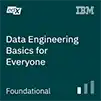IBM: Data Engineering Basics for Everyone
4.4 stars
9 ratings
Learn about data engineering concepts, ecosystem, and lifecycle. Also learn about the systems, processes, and tools you need as a Data Engineer in order to gather, transform, load, process, query, and manage data so that it can be leveraged by data consumers for operations, and decision-making.

4 semanas
9–10 horas por semana
A tu ritmo
Avanza a tu ritmo
Gratis
Verificación opcional disponible
Hay una sesión disponible:
¡Ya se inscribieron 21,246! Una vez finalizada la sesión del curso, será archivadoAbre en una pestaña nueva.
Comienza el 10 may
Data Engineering Basics for Everyone
Premios

De un vistazo
- Institution IBM
- Subject Análisis de datos
- Level Introductory
- Prerequisites
- Basic computer skills.
- General familiarity of how computing works.
- Grounding in IT systems.
- Comfortable working in either Linux, Unix, Windows, or MacOs.
- Associated programs
- Professional Certificate en Data Engineering Fundamentals
- Professional Certificate en Data Engineering
- Professional Certificate en Data Warehouse Engineering
- Language English
- Video Transcript English
- Associated skillsBig Data, Data Store, IBM Cloud Computing, Relational Databases, Data Lakes, Data Warehousing, Reporting Tools, Operations, Decision Making, Workflow Management, Data Integration, Data Engineering, Business Intelligence, Data Analysis
Este curso es parte del programa Data Engineering Professional Certificate
Más informaciónInstrucción por expertos
14 cursos de capacitación
1 año 2 meses
3 - 4 horas semanales
¿Te interesa este curso para tu negocio o equipo?
Capacita a tus empleados en los temas más solicitados con edX para Negocios.

